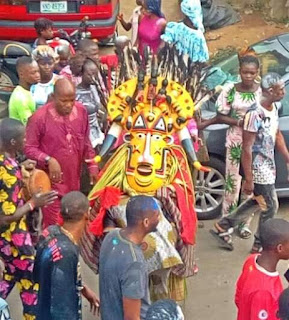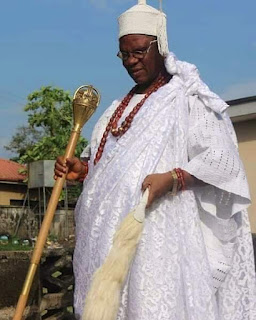This is a complete article on Ogun Festival, it gives an in-depth analysis to the origin of Ogun, with a view to exploring the fun and scary Epic Culture of the Nigerian tribes In West Africa.
 |
| Worshippers of Ogun (God of Iron) in Ondo City | Photo Credit: Getty Images |
The celebration of Ogun Festival across South-West is an epic, but fun moment to watch out for. Ògún in English means - "god of Iron". It is written with two slant strokes at the top of letter "Ò" and "Ú", the stokes on the word is to give the true meaning of the word; as writing the word with the strokes could be translated to many meanings by the reader. Hence, for the purpose of this article, the right work shall be adopted with the strokes - Ògún.
Ògún Festival is a well-known festival among the Yorubas in the South-West states and some Igbo tribes in the South-Eastern part of Nigeria. Some of the Yoruba states and localities that do celebrate Ògún Festival include: Ondo City, Ile Oluji town, Ekiti state, among others.
Origin of Ògún - god of Iron:
Ògún, as the name sounds implies Iron. Hence, Ògún Festival is a festival to remember the god of iron. Ògún deity is regarded as one of the strongest and brilliant among all the gods the Yorubas believed to have been created by Olódùnmarè (God). Ògún is believed to be a Male god and a very hardworking god.
Research by Daily News Report tells that Ògún is a warrior and a blacksmith. He specializes in iron bending and shaping of iron into various objects. According to the Yorubas, Ògún is hardworking and he performed excellent in his works. He is said to have fought some wars for the Yorubas during the ancient days.
History has it that Ògún deity is the first god who paved pathways for Human beings on Earth. In many years back, human beings, to include other gods created by God were said to have been living amidst the bush without no definite way to walk. History also made it known that while Ògún and other gods were traveling in the forest and they missed their route, it was Ògún that volunteered to take the lead by using his cutlass to clear the bush to pave way for all the gods. Ògún never carry last! May I remind you that Ògún was the first Man to use iron, Cutlass precisely.
All these works and greatness attributed to Ògún deity had made people to love and worship him. May I quickly remind you that most of the Yorubas who work or trade with iron do worship Ògún.
People who worship Ògún deity are:
- Vehicle Drivers
- Travelers
- Hunters
- Blacksmiths
- Market Men and Women
- Farmers, etc.
Farmers who worship Ògún will have a bounty harvest. Drivers and travellers who worship Ògún will move to and fro on the roads without having accident. Ògún is a god of peace as believed!
In Ondo City and Ile Oluji town, Ògún festival is marked by the Kings (Osemawe of Ondo Kingdom and Jegun of Ile Oluji) and their people on different days. But, history had been recording it that Ògún Festival in Ile Oluji do comes before that of Ondo City.
 |
| Current (King) Osemawe Of Ondo Kingdom, Oba Kiladejo, jillo III | Photo Credit: Ondo Diary |
The king isn't the only one involved. There are some households in Ondo City that are core celebrants of the Ògún Festival. They are mostly involved in Hunting, Blacksmith, Masquerade etc. Aside those set of people, research by Daily News Report has proven it that over 70% of the Ondo sons and daughters do directly and indirectly participate in Celebration of Ògún Festival.
To most homes in Ondo, they believed coming out to watch Ògún festival and its celebrants isn't a crime or sin. It's a tradition in Ondo; they believed watching Ògún Festival is more of cultural than religion.
Besides, Ògún is more of entertainment than worship. Only those who are the core Ògún celebrants; to include the Monarchs, do perform the traditions and sacrifices during the Ògún Festival. Other people only go out to view them for entertainment purpose.
The sacrifices done and given to Ògún on that day is meant to worship, thank and appease the Ògún deity. Besides, most of the sacrifices given to Ògún is often to make request as well. They are used to request for peace, love, joy, bounty harvest, clear the roads to prevent unwarranted accident, among others. Ògún is said to hate injustice. Hence, he will always fight against injustice for anyone who calls on him with open and clean mind.
Some of the items used in worshiping Ògún includes:
- Kolanut
- Cold water
- Dried rat or fish
- Red oil
- Palm tree leaf, (Màrìwò)
- Dog is an essential item to worship Ògún.
This is the original Eulogy of Ògún - god of Iron:
- Ògún lákáayé, oshìn gbogbo imolé - god of Iron the leader of all gods
- Òlómí nilé, fèjèwè - Ye that uses blood to bath when he has no water at home
- Òláso nilé, fimò kímò bora - Ye that uses palm trees
- Ògún ma pamí, ma fèjè mi wè - god of Iron, don't kill me, don't use my blood to bath.
In Ondo City precisely, people do come out in large numbers to view how the Ògún is being celebrated. Those core people you will see on that day include: Masquerades, Hunters, and people with both white and blue powders. Most roads are blocked with Banana trees to prevent passerby and transporters from running away when ògún people want to ask for money. When you fall into the Ògún boys and you don't give them money; they either pour white or blue powder on your body, or they leave you should you plead with them.
It should be noted that Ògún Festival is meant to unite the people. Hence, it is often peaceful, as Ondo Sons and Daughters at home and diasporas do come together to celebrate it.
 |
| People of Ondo City celebration Ogun Festival (2020)| Photo Credit: Facebook - FFC |
This is how Ògún is worshipped:
Ògún worshippers do set up different irons together in a place, they then turn such into the abode of Ògún. Easy to set up right! To them, they believed Ògún deity will live there. Hence, they worship it there. They offer those sacrifices to the Ògún on that spot of conglomerate irons.
This video clip is a documentary of Ogun cultural celebration in Ondo Town: Credit: Daily News TV
Ògún is believed to be friendly to those honest with him. He hate lies. Hence, to make peace with Ògún, honesty is the core key. The worshippers believed when you are honest with Ògún, and you worship him sincerely, you are safe. So, when next you see an Ògún worshipper, greet them with their usual slang "Ògún yè, mo yè!" meaning - god of iron is safe; hence, I'm safe!
© Daily News Report
